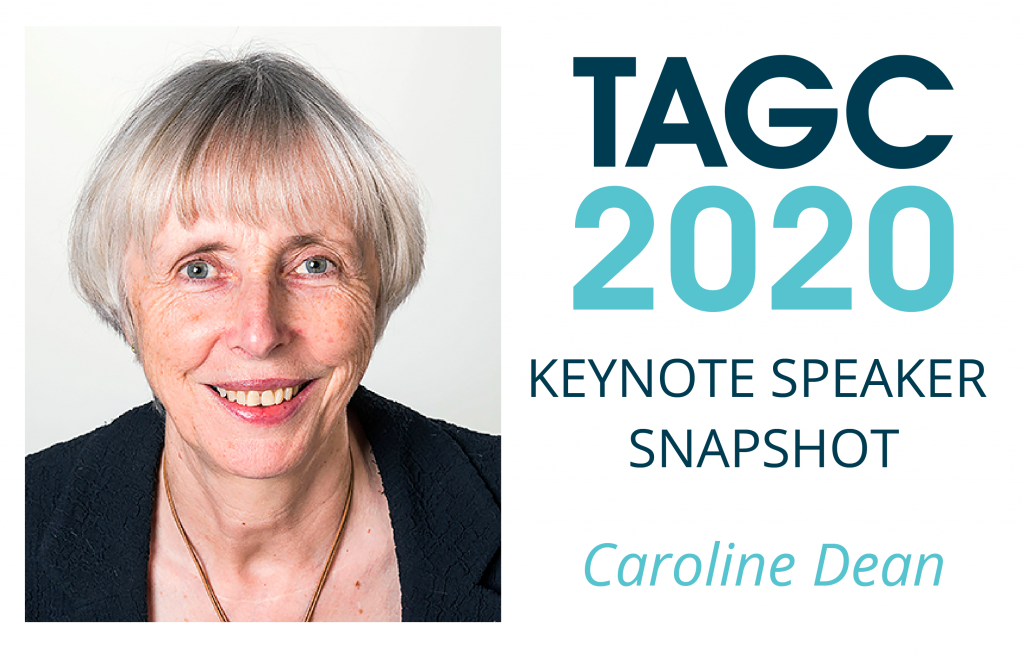Get to know the TAGC 2020 Keynote Speakers through our interview series.

Caroline Dean
Caroline Dean has been a project leader at the John Innes Centre Norwich since 1988. Her work on seasonal timing mechanisms in plants has led into a detailed mechanistic analysis of the regulation of the floral repressor FLC in Arabidopsis. FLC transcription is quantitatively modulated by an antisense-mediated chromatin mechanism that coordinately influences transcription initiation and elongation. The gene is also epigenetically silenced through a cold-induced, cis-based, Polycomb switching mechanism. FLC has therefore turned out to be an excellent system to dissect conserved mechanisms by which non-coding transcription and chromatin mechanisms regulate gene expression.
What research are you most excited about right now, and why?
I have always been fascinated by how plants flower so synchronously in spring. Plants need to integrate fluctuating temperature signals over many months and not get confused by a short period of cold in autumn. As soon as I had my own lab, I decided that that was what I was going to investigate.
The sensing and remembering of long-term temperature exposure is a process known as vernalization. I am particularly excited about our mechanistic studies aimed at understanding the molecular events behind the cold-induced silencing and epigenetic switching of an Arabidopsis gene called FLC, which is central to the vernalization process. It’s exciting that we now have the tools in Arabidopsis to dissect mechanisms that are central to seasonal timing in plants but also informative for basic epigenetic switching.
What do you like about working with Arabidopsis?
The scale of the community is amazing. I love the fact that there is so much available information and so many resources. Everyone is tackling different questions, and then serendipity comes along and connects the traits.
Is there anything about yourself or the field that made you feel like you didn’t belong in science? What would you say to early career scientists struggling with the same feeling?
For me, it was classic imposter syndrome. When you’re young, you think “This doesn’t make sense, but it’s what everyone else thinks, so I must be wrong.” I was always thinking that we must have gotten something wrong when we concluded something different to what was expected in the field. People assume that feeling goes away, but it doesn’t really. To early career scientists: always have confidence in your own assessment, and always ask the question—even if it might feel silly in your head. There will always be doubts and questions; my advice is to not let them overwhelm you.
TAGC aims to foster collaboration between communities and disciplines. Can you give an example of a collaboration that really helped your work?
After we’d done 20 years of genetics and uncovered a lot of molecular details, the molecular information became quite hard to put into a full picture. Many molecular mechanisms involve feedbacks and redundancies that make them very non-intuitive. We started to work with a theoretical biologist—Martin Howard—and that has made us stand back and put a framework together based purely on theory. We use theory to make hypotheses to test and then refine then theory, so the cycle of theory and experiment has helped us pick apart molecular mechanisms.
Select Publications from the Dean Lab
Distinct phases of Polycomb silencing to hold epigenetic memory of cold in Arabidopsis
Yang H, Berry S, Olsson TSG, Hartley M, Howard M, Dean C
Science. 2017 Sep 15;357(6356):1142-1145. doi: 10.1126/science.aan1121
Local chromatin environment of a Polycomb target gene instructs its own epigenetic inheritance
Berry S, Hartley M, Olsson TS, Dean C, Howard M
Elife. 2015 May 8; 4. doi: 10.7554/eLife.07205
Arabidopsis FLL2 promotes liquid-liquid phase separation of polyadenylation complexes
Fang X, Wang L, Ishikawa R, Li Y, Fiedler M, Liu F, Calder G, Rowan B, Weigel D, Li P, Dean C
Nature. 2019 May;569(7755):265-269. doi: 10.1038/s41586-019-1165-8
R-loop stabilization represses antisense transcription at the Arabidopsis FLC locus
Sun Q, Csorba T, Skourti-Stathaki K, Proudfoot NJ, Dean C
Science. 2013 May 3;340(6132):619-21. doi: 10.1126/science.1234848
Mutually exclusive sense-antisense transcription at FLC facilitates environmentally induced gene repression
Rosa S, Duncan S, Dean C
Nat Commun. 2016 Oct 7;7:13031. doi: 10.1038/ncomms13031































